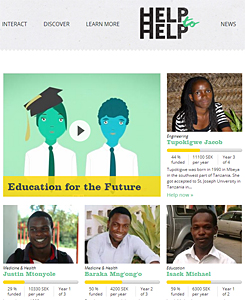Innovative student aid program taps grassroots support
Crowdfunding isn't just for bands and filmmakers anymore. A new student-run organisation in Sweden is supporting 21 Tanzanian university students while earning high marks for transparency.

Artists have financed projects with crowdfunding, and small businesses have used it to get on their feet. Now, the concept of crowdfunding is being taken further. A student at KTH Royal Institute of Technology has founded an organisation that draws on grassroots donations to support Tanzanian students’ education.
Help to Help is the brainchild of Malin Cronqvist, who says the fledgling non-profit provides donors with a level of transparency that many international aid programs lack. The program was launched in 2013 with help from KTH Innovation and Student Inc., and is run with three others, including KTH students Erik Bäck and Fredrik Hagblom.
Help to Help donors can choose which students they want to sponsor – there are profiles for each on the organisation’s website – and they can read in detail how the money will benefit them.
“You can communicate directly with the student and see what progress they make,” Cronqvist says. That direct contact, and the visibility of each individual in the aid program, offers donors a unique level of transparency.
“Without singling out specific organisations or aid projects, it has been difficult at times for donors to get direct feedback about where their money ends up or how it helps improve people’s lives,” she says. “There is simply too much administrative cost to provide such transparency. The best case solution has been to show that the money went, for example, to villages.
"Help to Help is a personal and transparent way to contribute,” Cronqvist says. “You decide whom you want to sponsor, and you can directly see how the money benefits them.”

In its first year, Help to Help was able to sponsor two students from Tanzania. This year donations have been used to sponsor 21 students. Cronqvist says the organization expects to sponsor at least 30 next year. Already, two students have graduated and gotten jobs, and five more will graduate this semester.
While focused on Tanzania, Help to Help has ambitions to scale up, and the organization is considering expanding into other African countries, such as Nigeria, Kenya and Ghana. But for now, Cronqvist says, the organization is focused on quality over quantity. Qualifying countries need to have banking systems free of corruption and enough good universities, she says.
There is no donation limit, but due to the cost of transactions, donors must contribute a minimum of 20 Swedish crowns.
Characteristic of most crowdfunding efforts, many of the donations are small. But that’s the point of crowdfunding: to target many givers of modest means rather than rely on a relatively small pool of big donors.
Students who are sponsored by Help to Help all come from low income backgrounds. “They are people in whom we see great talent and great drive,” Cronqvist says. “They will be able to contribute to Tanzania’s growth and the creation of more jobs when they finish their studies.”
Help to Help also looks for students who bring different networks, which increases their chances of success in their studies as well as in the job market.
Since its founding, Cronqvist has been named Innovator of the Year by Danske Bank for her work toward increased transparency in the international aid sector. One secret of her success, she says, is the help she received from Student Inc and KTH Innovation.
“It was when I came into contact with Student Inc and KTH Innovation that Help to Help started to really grow,” she says. “That’s because I good such good advice from the coaches there. It also didn’t hurt that I was a little naïve. You have to be a little naïve or all you will see are the problems,” she says.
Peter Larsson
For more information, contact Malin Cronqvist at +46 70 - 408 74 74 or malincr@kth.se
Visit Help to Help on the web.
